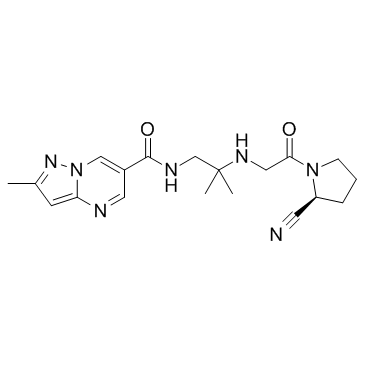| Description |
Anagliptin is a highly selective, potent inhibitor of dipeptidyl peptidase 4 (DPP-4), with an IC50 of 3.8 nM, and less selective at DPP-8/9 (IC50, 68, 60 nM, respectively).
|
| Related Catalog |
|
| Target |
IC50: 3.8 nM (DPP-4), 68 nM (DPP-8), 60 nM (DPP-9)[1]
|
| In Vitro |
Anagliptin is a highly selective, potent inhibitor of DPP-IV, with an IC50 of 3.8 nM, and less selective at DPP-8/9 (68, 60 nM, respectively). Anagliptin does not affect CYP3A4, CYP2C19, CYP2C9, CYP1A2, and CYP2D6 (IC50 >10 μM) or CYP3A4, CYP2C8, CYP2C9, and CYP1A2 at 50 μM. Anagliptin hydrochloride does not bind to the hERG channel (E-4031, >90% inhibition at 0.1 μM, IC50 >500 μM in patch clamp using HEK 293 cells)[1]. Anagliptin (1-100 μM) dose-dependently suppresses-DPP-4-induced smooth muscle cells (SMCs) proliferation, and reduces TNF-α production in cultured monocytes[2].
|
| In Vivo |
Anagliptin (0.3%) alters the quantity and quality of atherosclerotic lesions in apoE-deficient mice, and reduces DPP-4 activity in the plasma, and total cholesterol level, especially VLDL and LDL-C in mice. Anagliptin also decreases α-SMA-positive area and TNF-α-positive lesions in plaque area of apoE-deficient mice. In addition, Anagliptin does not increase the number of circulating endothelial progenitor cells (EPCs) in apoE-deficient mice[2]. Anagliptin (0.3%) decreases the low-density lipoprotein cholesterol and very low-density lipoprotein cholesterol, and also reduces the sterol regulatory element-binding protein-2 messenger ribonucleic acid expression level in mice[3].
|
| Cell Assay |
To evaluate the growth response of cultured smooth muscle cells (SMCs) to s-DPP-4, the bromodeoxyuridine (BrdU) incorporation assay is performed using cell proliferation ELISA kit. Briefly, SMCs are plated at a density of 3000 cells/well in 96-well culture plates with complete media. At 60%-70% confluence, the SMCs are pretreated with or without 1, 10 or 100 μM Anagliptin for 10 minutes and finally stimulated with soluble recombinant human (rh) DPP-4 (5 to 500 ng/mL) for 20 hours. Then, BrdU solution (10 μM) is added to the cells and the cells are cultured for another 4 hours. Then, the cells are dried and fixed, and the cellular DNA is denatured with FixDenat solution for 30 minutes at room temperature. A rat anti-BrdU monoclonal antibody conjugated with peroxidase is added to the culture plates and incubated again at room temperature for 90 minutes. Finally, tetramethylbenzidine is added before incubation for 15 minutes at room temperature. Absorbance is measured by a microplate reader at 370 nm[2].
|
| Animal Admin |
Mice[2] Male apoliporotein E (apoE)-deficient mice and C57BL/6 mice at the age of 7 weeks, are housed in specific pathogen-free barrier facilities. Mice are maintained under 12-hour light/dark cycle, and fed a standard rodent diet (22.6% protein, 53.8% carbohydrate, 5.6% fat, 6.6% mineral and vitamin mixture, and 3.3% fiber; total, 356 kcal/100 g) with water ad libitum. At the age of 9 weeks, apoE-deficient mice are fed Anagliptin-containing diet (0.3%, Anagliptin group, n = 30) or DPP-4 inhibitor-free diet (control group n = 30) for 16 weeks[2].
|
| References |
[1]. Kato N, et al. Discovery and pharmacological characterization of N-[2-({2-[(2S)-2-cyanopyrrolidin-1-yl]-2-oxoethyl}amino)-2-methylpropyl]-2-methylpyrazolo[1,5-a]pyrimidine-6-carboxamide hydrochloride (anagliptin hydrochloride salt) as a potent and selective DPP-IV inhibitor. Bioorg Med Chem. 2011 Dec 1;19(23):7221-7. [2]. Ervinna N, et al. Anagliptin, a DPP-4 inhibitor, suppresses proliferation of vascular smooth muscles and monocyte inflammatory reaction and attenuates atherosclerosis in male apo E-deficient mice. Endocrinology. 2013 Mar;154(3):1260-70. [3]. Yano W, et al. Mechanism of lipid-lowering action of the dipeptidyl peptidase-4 inhibitor, anagliptin, in low-density lipoprotein receptor-deficient mice. J Diabetes Investig. 2017 Mar;8(2):155-160.
|
